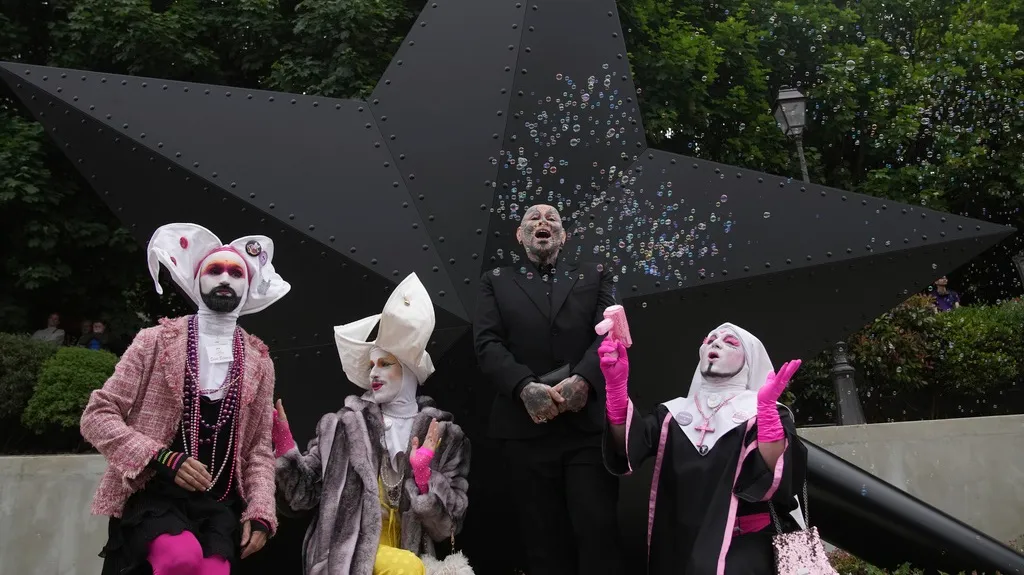May 13, 2010
Minister, once gay, aims to heal evangelical rift
Kilian Melloy READ TIME: 4 MIN.
Bill Henson is used to skepticism in his mission to bring together gays and evangelical Christians.
He spent years in a gay relationship, until he came to believe that homosexuality is a sin and married the only woman he says he's ever been attracted to.
The minister founded Fish On The Other Side (FOTOS) because he believes the church drives away gays with a narrow focus on sexual orientation, compared to its own sins.
Henson says the evangelical church should welcome gays without making it conditional on a change in their sexual behavior or orientation. He's given training sessions for clergy, radio broadcasts and talks at colleges, and last year he had a speaking slot at the prominent national youth missions conference, Urbana.
"What I'm going for is ... without changing the church's policy, to create a safe place for gay people to experience a journey of discovering God in our midst," Henson said.
Henson has been accused of watering down the Biblical message, while others believe his true aim is to get homosexuals to "convert" to heterosexuality, something he strongly denies.
Bill Carpenter, of the gay rights group Soulforce, sees Henson's conciliatory approach as a cloak for imposing a faulty Biblical interpretation that homosexual acts are sinful and gays are "broken" and need to change.
"I wouldn't want any human being to be told that, even if it's with a great big hug and a kiss on the cheek," Carpenter said.
Henson, 43, grew up in Texas and Oklahoma in a nominally religious family. He emerged from deep depression after he came out as gay in his 20s and entered a five-year relationship with a man he recalls as "beautiful."
He turned to the Bible in his late 20s after feeling an emptiness in his life, and became convinced homosexual acts were sinful. He never expected to be in another romantic relationship, but fell in love with his future wife at his church. The couple has two biological children and two adopted children.
In 2006, Henson gave up a marketing career to go into ministry full-time. Henson says he's "not 100 percent free of same-sex attractions," and doesn't expect other gays who turn to faith to end up in a straight marriage.
"I'm not out to sell it, I'm not out to promote it or to promise it, but it is something I've experienced," he said.
When Henson speaks before groups, he avoids polarizing political issues, such as gay marriage (Henson supports traditional marriage), seeing them as so divisive they destroy the common ground he seeks.
If his work expands, Henson will have a hard time staying above the political fray because both sides have so much as stake, said Mark Yarhouse, director of the Institute for the Study of Sexual Identity at Regent University, a Christian school in Virginia.
"If his ministry takes off and gets on the radar screen, then I think those who are involved in political issues are going to take him on," Yarhouse said.
FOTOS is similar to a handful of orthodox Christian ministries, such as The Marin Foundation in Chicago, though Henson has a uniquely heavy focus on reaching the evangelical church.
Henson said evangelicals have too often offered only alienation and judgment to gays, shutting out many from the grace and joy found in faith and depriving itself of the talents of the gay community.
"What we've really created is a nice, comfortable gospel for us, but then we use that to inflict heavily on others who sin in the ways we don't," Henson said.
Henson thinks the church is responsible for repairing its relationship with gays - though it's not solely at fault - because God has given it the job of effectively delivering the message of salvation to all groups.
He finds surprising support for his ministry among some Christian groups, such as Exodus International, known for trying to help people change from being gay to being straight. Exodus president Alan Chambers said he's come to believe in recent years that his group has wrongly overemphasized changing a person's sexual orientation. Some people change their orientation, he said, but some never will.
"We have to understand there's so much more to a relationship to Christ and a new identity than attraction," Chambers said. "God doesn't want someone's homosexuality, He wants their heart, and when He has their heart, He can do anything with them."
Bob Stith, the Southern Baptist Convention's strategist on gender issues, said hundreds have told him of their hurt from preachers who emphasized condemnation for gays but never talked about redemption.
"I do see the tide changing in the church," Stith said.
As a policy, Henson won't approach the gay community unless invited, as he was last month at Wheaton College in Norton for a "dialogue" between its Christian and gay community.
At a pre-event meeting there, a Christian gay man, Onyedikachi Udeoji, questioned whether Henson was couching what the Bible says about homosexuality.
Afterward, Udeoji talked about his struggle with faith because he thinks the Bible is clear that homosexuality is wrong. Henson's emphasis that Christians shouldn't treat homosexuality as a special sin was beside the point, he said.
"If what you are is a sin, how do you reconcile that with being Christian?" Udeoji said. "It's always that thing in the back of your mind that you are not right and settling with that, it's a tough cross to carry."
Peter Szabo, head of Wheaton's gay advocacy group The Alliance, said he doesn't believe homosexuality is sinful, and was encouraged by Henson's ministry because it can open up faith to gays who reflexively see evangelicals as hostile.
"Some evangelicals would be like, 'We'll accept you even though you are so low,'" Szabo said. "But he says ... in the eyes of God we're on the same level."
Kilian Melloy serves as EDGE Media Network's Associate Arts Editor and Staff Contributor. His professional memberships include the National Lesbian & Gay Journalists Association, the Boston Online Film Critics Association, The Gay and Lesbian Entertainment Critics Association, and the Boston Theater Critics Association's Elliot Norton Awards Committee.






